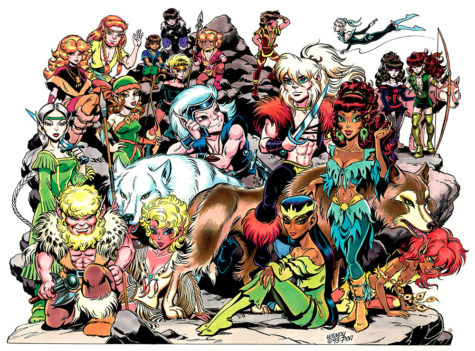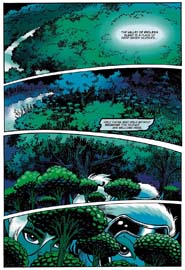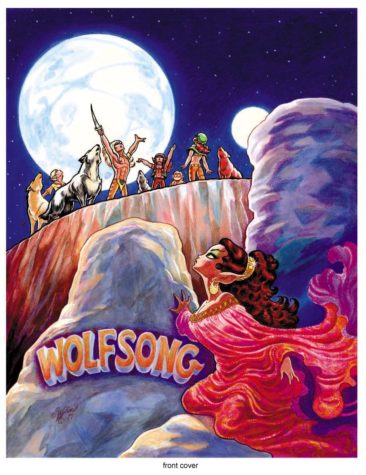 I first saw the elves on the floor of my best friend’s station wagon when I was seven. Grinning up from the back of a big book, these elves looked different from any other elves I’d seen. I’d always thought elves were a little wimpy, but instead of being fragile fey, these elves seemed fun. Even better–they had wolves!
I first saw the elves on the floor of my best friend’s station wagon when I was seven. Grinning up from the back of a big book, these elves looked different from any other elves I’d seen. I’d always thought elves were a little wimpy, but instead of being fragile fey, these elves seemed fun. Even better–they had wolves!
This was my first experience with Elfquest, a fantasy comic series that is celebrating its 40th anniversary this year. The series, created by Wendy and Richard Pini, chronicles the adventures of an elfin tribe that has a deep connection to their landscape and to wolves. Years ago, I read and re-read the first four graphic novel compilations so often that the pages grew soft. Recently, I came back to Elfquest after a long absence to find that not only had new installments had appeared, but that an extensive community of Elfquest lovers was frolicking (and also, delving into extensive analysis and speculation) online.
One of these Elfquest superfans is David Mizejewski, who has been the co-host of a podcast dedicated to the most recent part of the series, Elfquest: The Final Quest. He’s also a naturalist who works for the National Wildlife Federation and he appears regularly on television and radio shows to talk about wildlife.
As I listened to the podcast, I found that Mizejweski was sprinkling in details about altruism in nature and wolf social structure as he discussed the latest cliffhanger with co-host Ryan Browne. Last month I talked with him about the connection between his work as a naturalist and his interest in the series. The following is a condensed and edited version of our conversation.
How did you become a naturalist?
I have a degree in human and natural ecology from Emory University. My original plan was to pursue a career in policy and advocacy for strong wildlife and environmental protection laws, which is a critically important area of work for effective conservation, so I paired my ecology degree with a political science one. But I realized that I hated working in the political realm—it’s hard, and it’s adversarial, and it wasn’t where my personal passion or, frankly, where my skillset was. I graduated feeling a little bit deflated.
For lack of something better to do, I got a seasonal job out of college at the Chattahoochee Nature Center in Georgia, where I taught seven- and eight-year-old kids about nature and wildlife. I realized that what I’m good at is being a nature geek and sharing my knowledge about wildlife in a way that educates and inspires people to care about wildlife and support conservation. That is the definition of a naturalist.

And then how did you get interested in Elfquest?
The very first spark was the art. It was the cover of the Donning Starblaze edition of Elfquest, Book 2, that shows two of the main characters, Cutter and Skywise, with the forest as the backdrop. There was this lush, dense woodland with these fascinating, beautiful, spooky elves–flanked by wolves. It struck a chord with me. And it was 100 percent because that art depicted nature.
Lots has been written and said about Elfquest’s uniqueness in the comic space. And one of the things that makes the series different is that it starts in a prehistoric era, and it follows characters who live in nature and have a tight connection to nature.
In the very first issue, you have something happen—humans burning down the elves’ forest home—that sets up this major environmental theme, the human destruction of nature. And this theme is so intricately woven into the whole story.
One of the things that drew me to Elfquest in the first place was the relationship that one of the groups of elves, the Wolfriders, has with their wolves. Why do you think that’s so important to the story, and how similar are the wolves in Elfquest to wolves in our world?
 For whatever reason, a lot of people are really drawn to wolves. They are social animals. They have families. They are the ancestors of domesticated dogs. They are part of the mythologies of cultures around the world. And this social aspect is probably why they were chosen to be so important to the main characters of Elfquest.
For whatever reason, a lot of people are really drawn to wolves. They are social animals. They have families. They are the ancestors of domesticated dogs. They are part of the mythologies of cultures around the world. And this social aspect is probably why they were chosen to be so important to the main characters of Elfquest.
One of the things that I most love and appreciate about Elfquest is the accurate representation of wolves. This goes deep to the core of what Elfquest is about. The elves’ whole society is loosely based on wolf society. Very quickly, in developing Elfquest, Wendy and Richard Pini learned more about wolves in the real world, including wolf behavior and social structure. And they pretty much nailed it. The wolfpack is a family, just like the tribe.
There are dominance struggles, both in nature and in the series. In The Kings of the Broken Wheel, the Wolfriders meet up with another tribe, and the two wolf packs meet as well. One of the new wolves attacks Starjumper, a beloved older wolf, and Skywise, his elf companion, has to put the old wolf down. That happens. Wolves are territorial, they will kill each other. The Pinis used that knowledge of natural wolf behavior to create a huge emotional wallop and gutpunch for the readers.
Did reading Elfquest influence your work as a naturalist?
Being an Elfquest fan from a young age definitely helped me form my conservation ethic, and helped me understand ecology. And this is a big thing. If you’re familiar with Elfquest, it’s all about living in harmony with the natural world, and being in balance with the world. That’s what ecology is all about.
In particular, Elfquest really helped me as I’ve developed a more mature viewpoint of how life works on this planet. It’s helped me manage on a psychological and emotional level that horrible things happen to animals every day on this planet. I mean, baby animals are brutally ripped apart by their predators, and it’s totally part of the natural process.
The thing that makes me be able to accept that is knowing that it’s normal and natural and part of a natural process. To conservationists, the unit of importance is not necessarily the individual animal, but the species. In the series, the Wolfriders kill and eat animals, but not with cruelty, and not in a way that causes things to go extinct. Elfquest helped me understand just that point—that the science of conservation is about habitat and species and protecting this bigger-picture balance.
**
Elfquest images © Warp Graphics, Inc., used with permission.
Thanks, Cameron, for the opportunity to talk about two of my most favorite subjects, wildlife conservation and ElfQuest. Of all the media interviews I do each year as part of my job, this one was by far my favorite. I hope it inspires people to check out http://www.elfquest.com and find out for themselves what a unique and special series it is.
I know you hear lots of stories of how ElfQuest influenced people’s lives. Please take this moment to hear mine. Their storytelling reached a Latina woman born 1969 from East New York Brooklyn, NY. Not a nice neighborhood in the 70’s 80’s. A lot of crime and you always had to watch your step. I learned comics from stealing what was stored in my brother’s room. Of course he knew I was stealing them but he never let on and he let me. It opened a wonderful new world. That’s how I came to ElfQuest, it was stealing like Old Maggoty and her Dreamberry bushes. Stealthy grabbed the first Graphic Novel then the second then the third! Sneaking into my brother’s locked room and grabbing what I could then running to my room to read them. Stealing ElfQuest Graphic Novel was the best thing I ever did and never regretted. (I never gave it back. I still have it!) As I grew to adulthood I never really understood the magnitude the ElfQuest voice had for me. That the story telling has gotten me through the most hard moments of my life. Now for the hard part for me. Telling you why. Here I go: Being diagnosed and treated for Breast Cancer it never really prepares you for the aftermath. Oh don’t get me wrong plenty of support groups and therapy etc. But being “prepared” never. You MUST understand my influences come from ALL WOLFRIDERS. BUT Ekuar being an elf tortured and maimed still believing in his life with joy is how I face every day without breasts having pain and still enduring because I AM STILL HERE. No one has been able to understand that. I really don’t share it with anyone. They see me with a haircut and makeup and me standing up thinking nothing is wrong with me. I struggle everyday through pain. Struggle with the effects of radiation and chemo physically and mentally. I still smile because Ekuar says, “You look at me with pity? Why? I am here. I am free. I belong to myself” These words so powerful yet go hardly noticed. He is wonderful because he is an amputee like me. ElfQuest gave me this wonderful gift like a fragile healing light of “sending” through the darkness of my heart and soul. When I met WaRP both at Meadowlands East Coast ComicCon 2018 I was the one so overwhelmed I had to make them hear me. I was shaking and steaded myself on the table. Wendy gave me a moment and advice in my own private life moments that I won’t share here. I was shaking and crying but I hope Wendy and Richard Pini understood I am ever so grateful for their talent. The journey they shared with me is priceless beyond words. I share this with my best friend Ralph Acosta who is an ElfQuest fan like me. When he met them at the airport where he worked he rushed to share it with me. Not his girlfriend or family. He shared his moment with me and we marveled how these 2 great people appreciate how we love them. No one else understands our love for ElfQuest but we to each other. We talk and argue using ElfQuest images and language for our point of reference to make us understand each other. I love my best friend as much as ElfQuest. Thank you.
#fortyyearsofpointedears
Elfquest brought me sooooo many friends that I consider family. Like David and others. We all seem to have a hive mind on how nature and animals and life should be respected and forgiven. The Pinis often say they didn’t set out to have a message but they have and it is beautiful
Elfquest has gotten me through one of the most difficult years of my life. I lost my dog of 15 years, lost my best friend of 13 years, and then temporarily lost my ability to run. A friend introduced me to “Elfquest” to take my mind off of things (because she knew I liked J.R.R. Tolkien). Little did I know I would find all kinds of profound, meaningful life lessons within the Pinis’ stories. A comic book series helped me process loss, grief, and pain (both mental AND physical). I was transported to another world as I was chair-bound; Two-Moons kept me sane since I could no longer run through the woods myself. The art and the HEART behind every story touched me on a level deep within my soul, and taught me things about life one would not expect to learn from a comic book. I could relate to Wendy’s agony in the loss of her ability to dance, but was endlessly inspired by her decision to rise above and continue making beautiful work despite her pain. Elfquest has changed my life by giving me a new perspective and a fresh outlook on things when they go wrong, when they go right, and everything in-between.
How Elfquest affected my life…
When I was introduced to Elfquest, my adoptive parents had met Wendy and Richard in Poughkeepsie and were given out some issues of the Original Quest. They knew that I was into fantasy and Dungeons and Dragons, and for some reason they felt that this was important. I worked after school delivering papers just to come up with enough money to buy the entire series and follow the story of the Wolfriders. Perhaps it was the fact that the story was about a tribe of close knit elves who were out of their element on a strange planet that drew me to Elfquest. I had, up until that point, seen comic books as fluff stories of action and good guy/bad guy stories… perhaps comic books were something more adventurous when presented from a feminine point of view, that the world was scary and dangerous and that the most powerful kings could be taken down by the power of unity and family.
Elfquest changed my life forever. It taught me that love is really about accepting people as they are – especially yourself. It taught me that women artists have as much influence in storytelling as men and often their stories hit harder and deal with the tougher topics. Elfquest taught me to be patient with Richard teasing at the end of every issue “See you in 60!” meaning that I would have to wait twice as long for a comic book of quality than I would for the average papermill Marvel or DC. It taught me that you didn’t have to have the same opinions or ideologies that your favorite writers and artists have… If you think for yourself, you’ll always find someone in their universe of characters to identify with. Lastly, Elfquest taught me that the artists love feedback from the fans and the interaction that fans and the storytellers share through the “Letters to the Editor”.
I think that if more skeptical adults actually took the time to read stories like Elfquest, perhaps they would find deeper meanings and connections with other people instead of mocking what they don’t understand. Elfquest is a whole universe within the Marvel Universe and the DC Universe and Dark Horse’s Universe and it’s connected to more fans that Marvel, DC and Dark Horse fans realize. Elfquest has a Cult-like following because it is a cultural phenomenon started by two people who loved comic books and storytelling and had a story that they needed to tell fans. We are all fortunate to have been allowed on their journey from Sorrow’s End to the Palace of the High Ones and beyond.
Excelsior! #40YearsofPointedEars
Elfquest has instilled in me the thought of living in the now. It’s said in many cultures, but the wolf thought brought it home. There is nothing you can do about the past, the future hasn’t happened so why stress over it, the present is right now and you can do anything you like with it. I try to use the now to enjoy my critters and the nature around me, when I’m with friends and family to enjoy their presence and conversation, when I’m at work to have focus to do my job at hand. Being in the now has made my life a lot easier in very many ways.
Dear Elfquest lovers, thanks so much for reading and for sharing your stories about Elfquest. I hope you’ll stick around and explore The Last Word On Nothing. The world we write about here has only one moon, but we’re hoping to share some of its complicated, beautiful, frustrating, compelling stories with you. Please make yourselves at home.
Aside from the very obvious influence Elfquest has had on my art and writing, when I had to take my elderly cat on his final trip to the vet last Friday, I thought about how much he was probably like Nightrunner. My cat didn’t know it was goodbye; he just knew that he was tired, and always sore, and didn’t want to be. Death isn’t the enemy; it just is. Knowing that doesn’t keep me from missing him, of course.